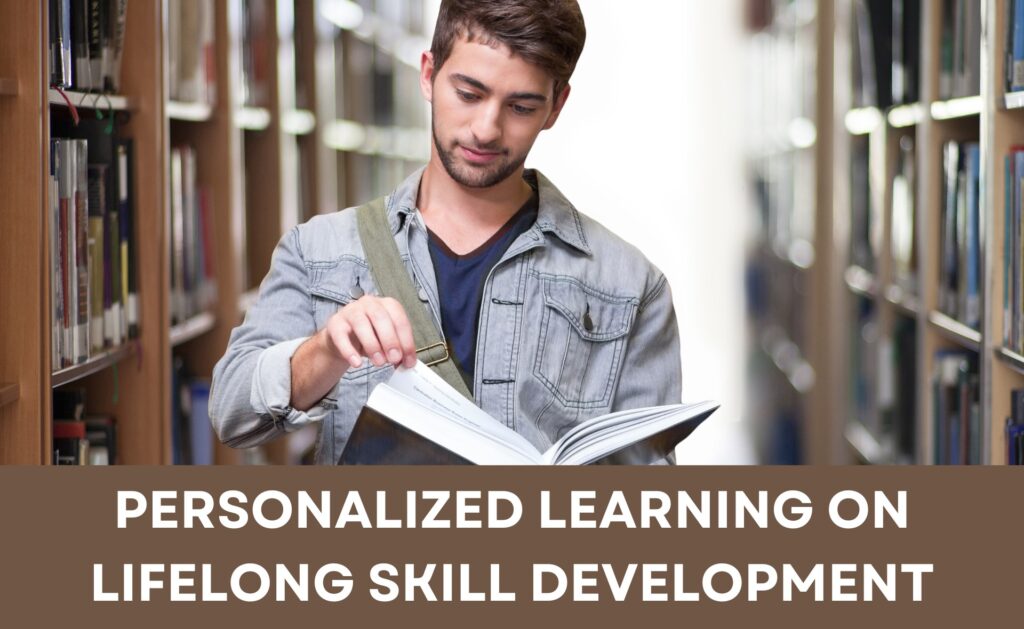In today’s fast-paced world, the skills required for success are constantly evolving. From technological advancements to shifting industry needs, professionals and learners alike must adapt quickly to remain competitive. However, traditional education models often fail to provide the flexibility and customization necessary for individuals to thrive in this ever-changing landscape. Enter personalized learning, a powerful educational approach that tailors learning experiences to individual needs, preferences, and goals.
Personalized learning is not just a passing trend—it’s a paradigm shift in how we think about education and skill development. By focusing on the unique strengths and challenges of each learner, this approach provides the opportunity for more effective, engaging, and efficient learning. In this blog post, we’ll explore how personalized learning is revolutionizing lifelong skill development, and why it’s essential for staying ahead in the modern workforce.

Table of Contents
What is Personalized Learning?
Before we delve into the impact of personalized learning on skill development, it’s important to first define what personalized learning actually means. At its core, personalized learning is an approach to education that tailors the pace, content, and methods of learning to the individual needs of each learner. This contrasts with traditional “one-size-fits-all” teaching methods, where all students follow the same curriculum at the same pace.
Key elements of personalized learning include:
- Pacing: Learners progress at their own pace, rather than moving through content at a fixed speed. This allows individuals to spend more time on areas they find difficult while accelerating through topics they already understand.
- Content: Learning materials are often customized based on the learner’s interests, strengths, and weaknesses. This can include using digital tools and platforms that adjust content based on real-time feedback.
- Methods: Different learners have different preferences when it comes to how they learn. Personalized learning accommodates various learning styles (e.g., visual, auditory, kinesthetic) and provides learners with a variety of methods to choose from.
- Assessment and Feedback: Personalized learning systems often employ continuous assessment and instant feedback mechanisms to ensure learners understand the material before moving on.
Personalized Learning and the Changing Nature of Skill Development
In the past, skill development often took place in formal educational settings—schools, universities, or specialized training programs. However, the rise of technology, automation, and the global economy has drastically changed the way skills are learned and applied. Many of the skills required in today’s workforce didn’t even exist a few years ago, and this rapid pace of change shows no signs of slowing down.
As industries evolve, so too must the skills needed to thrive within them. Personalized learning helps meet this challenge by providing more flexible and targeted pathways for skill acquisition, allowing individuals to adapt to changes more quickly and efficiently.
Here are a few key ways personalized learning is impacting lifelong skill development:
1. Bridging the Gap Between Education and Career
For many people, the skills they acquire in formal education are no longer sufficient to meet the demands of their careers. Technology has disrupted industries and created new job roles that require skills not traditionally covered in educational curricula. Personalized learning helps bridge this gap by allowing individuals to develop new, specific skills that align with their career aspirations and the current job market.
Through platforms like Coursera, edX, and Udemy, learners can access tailored courses that focus on practical skills in areas like data science, coding, digital marketing, and more. These courses often allow learners to choose content based on their experience level and career interests. With the ability to learn at their own pace and access up-to-date materials, learners can continuously upgrade their skill sets, ensuring they remain competitive in their fields.
2. Enhancing Learner Engagement and Motivation
One of the biggest challenges with traditional learning models is keeping learners engaged and motivated. With personalized learning, learners are more likely to stay engaged because the learning experience is tailored to their individual needs and preferences. When students are able to progress at their own pace, focus on areas of interest, and receive immediate feedback, they are more likely to feel motivated to continue learning.
Personalized learning fosters intrinsic motivation by giving learners a sense of ownership over their learning journey. This sense of control and autonomy is especially important for adults pursuing lifelong learning, as it helps them stay invested in the process, even when juggling busy schedules or career commitments.
3. Enabling Continuous Learning
In the modern world, skill development isn’t limited to the years spent in formal education. Lifelong learning has become a necessity, as individuals must continuously update their skills to keep up with technological advancements and changing job requirements. Personalized learning is well-suited to support this ongoing process.
Unlike traditional education models, personalized learning doesn’t end after a set period. It’s an approach that can be employed throughout a person’s career, offering them the flexibility to learn new skills, expand their knowledge, and refine their expertise over time. Whether it’s through online courses, self-paced tutorials, or microlearning modules, personalized learning allows individuals to seamlessly integrate learning into their daily lives.
4. Supporting Diverse Learning Needs
One of the most powerful aspects of personalized learning is its ability to cater to learners of all backgrounds and abilities. Whether a learner is just starting out in a new field or looking to deepen their expertise, personalized learning adjusts to meet their specific needs.
This is particularly beneficial for learners who may struggle with traditional educational methods. For example, individuals with learning disabilities or those who face other barriers to education can benefit from personalized learning’s flexible approach. By providing alternative methods of instruction (e.g., video, audio, text), personalized learning ensures that every learner has an opportunity to succeed, regardless of their learning style or challenges.
5. Cultivating Soft Skills
In addition to technical expertise, many of the most sought-after skills in the workforce today are soft skills, such as critical thinking, problem-solving, communication, and emotional intelligence. These are often more challenging to teach through traditional methods, but personalized learning offers unique opportunities to develop these important skills.
For instance, personalized learning systems can present learners with real-world scenarios and problem-solving exercises that hone their ability to think critically and make decisions. In addition, many personalized learning platforms encourage collaboration and peer feedback, helping learners develop communication and teamwork skills. By cultivating both technical and soft skills, personalized learning prepares individuals for the demands of modern workplaces.
6. Providing Real-Time Feedback and Assessment
Traditional learning models often rely on periodic assessments, such as exams or quizzes, to measure a learner’s progress. However, this approach can be slow and disconnected from the learning process itself. Personalized learning, on the other hand, offers continuous feedback, enabling learners to understand where they need to improve and make adjustments in real-time.
For example, many online learning platforms use AI-driven algorithms to assess a learner’s performance and provide immediate feedback. This feedback helps learners identify areas where they need to focus more attention, and it enables them to make corrections before they move on to new material. This instant feedback loop is crucial for effective skill development, as it ensures learners stay on track and don’t fall behind.
7. Empowering Learners to Take Ownership of Their Education
Personalized learning empowers learners to take charge of their educational journey, giving them the ability to choose what they want to learn, how they want to learn it, and when they want to learn it. This sense of agency is particularly important for adult learners, who often juggle learning with career, family, and other responsibilities.
By giving learners the autonomy to shape their learning experience, personalized learning helps develop self-directed learners who are motivated and capable of independently managing their skill development. These learners are better equipped to navigate the complexities of today’s rapidly changing world, where continuous learning is essential for success.
Conclusion: The Future of Personalized Learning in Lifelong Skill Development
The impact of personalized learning on lifelong skill development is undeniable. As the workforce continues to evolve, personalized learning will play an increasingly important role in helping individuals stay relevant and competitive. Whether through online courses, AI-powered platforms, or adaptive learning tools, personalized learning provides the flexibility and customization needed for learners to thrive.
By focusing on the unique needs of each individual, personalized learning empowers learners to develop both technical and soft skills, cultivate self-directed learning habits, and stay engaged throughout their educational journey. In an age where the only constant is change, personalized learning is the key to unlocking lifelong success and adaptability.
The future of skill development lies in the ability to continuously learn, adapt, and grow, and personalized learning is the tool that will make this possible. As the world of work becomes increasingly dynamic, those who embrace personalized learning will be better equipped to meet the challenges of the future and unlock their full potential.
Unplug to unlock growth! Join the Digital Detox Challenge 2024 and boost your learning focus, skill development, and personal growth by stepping away from digital distractions.
“This Content Sponsored by Genreviews.Online
Genreviews.online is One of the Review Portal Site
Website Link: https://genreviews.online/
Sponsor Content: #genreviews.online, #genreviews, #productreviews, #bestreviews, #reviewportal”
